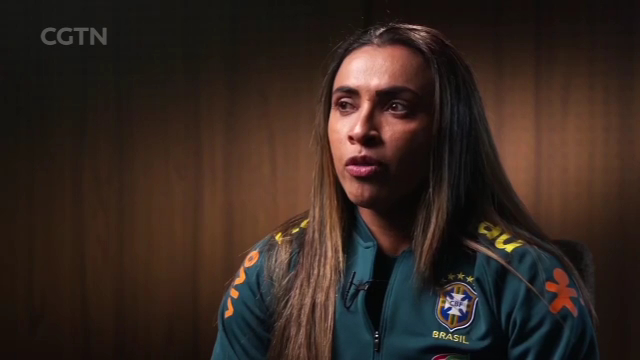
16:37, 08-Jun-2019
2019 FIFA Women's World Cup: Marta leads Brazil to tournament for fifth time
Updated
00:01, 10-Jun-2019
04:04

We turn our attention back to the Women's World Cup, and take a look at the most famous striker in the ladies game, Brazil captain Marta, who has led her squad to this event for the fifth time. CGTN's Miuda Valls has more on one of the best female footballers in history.
To many fans, Marta Vieira da Silva is known simply as Marta. She's the most prominent name in women's football history. She has won the FIFA World Player of the Year Award SIX times. The first honor came in 2006 when she was 20.
MARTA BRAZIL FORWARD "Wow, it's an incredible feeling! Difficult to explain. I started to remember the first time I trained professionally; the times I played in the street in my city and how hard it was because the boys did not want me to play. I had to fight them head-on and beat them up, so I could play on the team."
Marta was born into a humble family in Dois Riachos, a town in the Brazilian state of Alagoas. Her father left home when Marta was still a baby, leaving her mother in charge of raising four children. While her mom was out working, Marta played street soccer with the boys.
MARTA BRAZIL FORWARD "Many times the boys were much bigger and stronger than I was, but I still managed to stand out among them."
Tota, Marta's first coach, took us to the place they used to play. On those days, this area was covered by sand. When Marta was 10, Tota placed her in the Sao Sebastian School futsal team, a small-sided version of football. As one of the best players among the boys, they tried to ban her.
TOTA MARTA'S FIRST COACH "If it weren't for me, she would have been kicked out. I said, 'She's enrolled. She's in school, therefore she's on the team. If she can't play, the team won't play'."
In a country where football is rooted in its culture, women were banned from the sport from 1941 until 1979, on the grounds that it's not compatible with their nature. As a result, gender stereotypes and discrimination were always present when Marta was growing up.
MARTA BRAZIL CAPTAIN "Prejudice was too great to dismiss and it was very clear. It was something that people constantly experienced."
But that didn't stop her from following her dream of becoming a professional player, and when she was 14, she took a bus trip to Rio de Janeiro to try out for the professional women's football team Vasco da Gama. From the beginning, coach Helena Pacheco knew that Marta would go far.
HELENA PACHECO MARTA'S FORMER COACH "She was obsessive. She liked training and being coached. You have a talented girl willing to work and this will always lead to her success. I did not know that in her case success was going to be so great."
Marta's debut on the international stage came when she was 17, during the 2003 World Cup. A year later, she joined the Swedish football team in Umea. In 2009, she signed with the Los Angeles Sol, and since 2017, she has played for the Orlando Pride of the United States National Women's Soccer League. She won three Copas America, two Olympic silver medals, and one UEFA, among other titles. And now she dreams of winning the gold in France. But Brazil's team isn't playing its best. It has lost nine consecutive times leading up to the World Cup.
MARTA BRAZIL CAPTAIN "It is up to us athletes to join forces, to do our best so that we can regain our confidence that we can fight against the big teams and fulfill our dreams, which are not only Marta's dreams, but also so many other athletes and so many others who want to be here."
Miuda Valls, CGTN, Rio de Janeiro.

SITEMAP
Copyright © 2018 CGTN. Beijing ICP prepared NO.16065310-3
Copyright © 2018 CGTN. Beijing ICP prepared NO.16065310-3